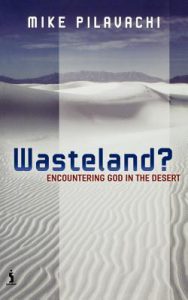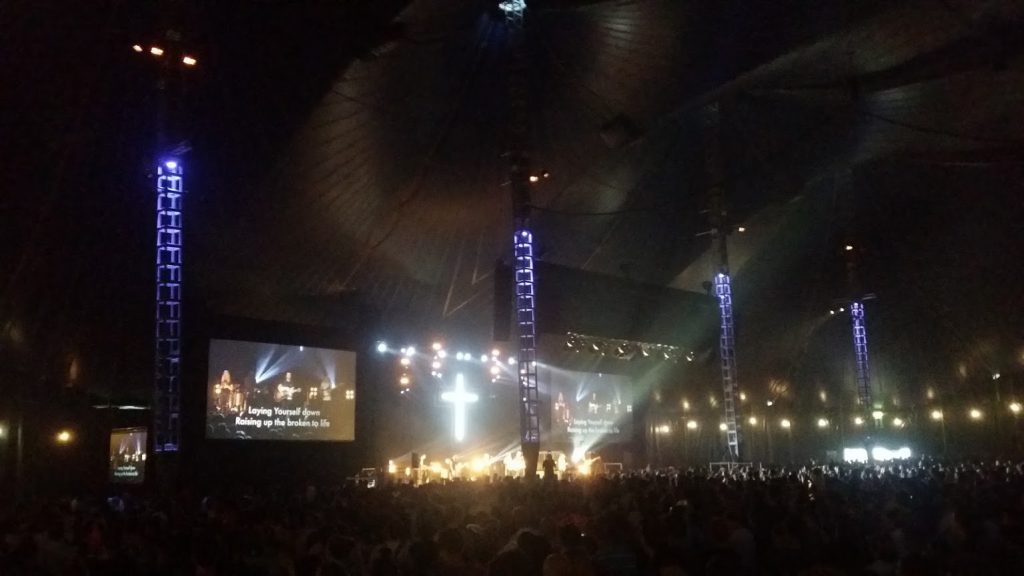Naturally Supernatural: Contemplative and Charismatic
 I have just returned from the Naturally Supernatural Winter conference, held and hosted by Soul Survivor Church Watford. The form and substance of it would be familiar to anyone who has attended any of the Soul Survivor youth festivals in the last couple of decades: Charismatic worship and ministry that is both invigoratingly contemporary and solidly cemented in old school Wimberesque wisdom.
I have just returned from the Naturally Supernatural Winter conference, held and hosted by Soul Survivor Church Watford. The form and substance of it would be familiar to anyone who has attended any of the Soul Survivor youth festivals in the last couple of decades: Charismatic worship and ministry that is both invigoratingly contemporary and solidly cemented in old school Wimberesque wisdom.
My intention here is to give a short reflection on my own personal experience of this week, and highlight one particular realisation: Not only was this a charismatic conference, with all its joys and highlights, it was also, unexpectedly, a contemplative retreat. Let me explain:
The charismatic aspect is obvious, not just in the substance of it, but in the form: Three sessions a day, each headed up by 45 minutes to an hour of musical worship, before a teaching time, and “ministry time.” NSN does it well. The songs (while occasionally a little, um, committed to the “high rotation” list) were declarative; they were worshipful in the truest sense of recognising God and our right place before him. The teaching was biblical, the personalities large but self-effacing, the prophetic words were gentle and constructive, and the times of expecting the Spirit to be ministering were emphatically disconnected from hype and manipulation. The focus was not on some glitzy self-prospering, but true mission; it was an exhortation to change the world, beginning by lining ourselves up with the love of God in Jesus. I’ve touched on this before.
The contemplative aspect of it, however, may not be a first thought. But look at it like this: My personal experience this week was a spiritual journey. It had this sort of shape:
- An encounter with hope. The early times of worship (and excellent teaching from Ali Martin) connected me with the hope of the gospel. My encounter began with comfort, feelings of being able to soar, and of being called to deep life-changing gospel truths.
- An encounter with brokenness. The Word of God reveals. We find ourselves exposed with our hurts, sins, brokenness. I felt blocked, incapable of fully grasping or expressing the love of God. It was a time of thirsting, of being uncomfortable. As the deer pants for the water, I experienced a longing for the rich absolution of a renewed “right spirit” within me.
- An encounter with godly frustration. As speaker after speaker (but I’m thinking especially of Tre Sheppard) reminded us again and again of the mission of God, those old vocational fires began to burn. They had been smouldering and now they were blown into a consuming flame. “Woe to me if I do not preach the gospel!” (1 Cor 9:16). Even if it means I burn up, “for the sake of the world, burn like a fire in me.”
- An encounter with painful release. There are times when Mike Pilavachi is Grecian comic, and then there are times when he speaks words of heavy, pregnant, prophetic, truth. As he spoke about the call of the church away from dysfunction to mission, the truth lapped upon me like antiseptic on a wound. The Spirit of God took me by the hand to encounter some of those hurts and burdens that accrue in ordained ministry, even and especially in this otherwise green and pleasant land. I groaned from the depths of myself, as the Holy One reached in to heal. “Even what the enemy means for evil, he turns it for our good.”
- An encounter with gentle mercy and ministry. I could describe it like this – “I was able to pray for and minister to others” – but that wouldn’t be entirely accurate. It was more a case of being allowed to stand close to people and watch the Spirit of Christ do his thing. I got to watch and pray, to observe and listen, to simply be alongside those who were being brought to something new. What a privilege. When I got to say something, all I was doing was describing what I could see: “prophetic” words as a simple testimony of the immediate. And others did the same for me; loving words were both given and received.
- An encounter with peace. At the end of the week I received a benediction, spoken over me not by the grand Greek guru at the front, but by a young woman who had the boldness to approach a big ugly Australian with a word of encouragement. It released, commissioned, and completed something. What a gift.
- An encounter with fellowship. Connections of kindredness that welled up and simply happened. Brothers and sisters to know by name. Recognition of one another. Collegiality. “Your bride will come together, and we’ll sing.”
The thing is, I’ve been on these sorts of spiritual journeys before. On quiet days, or in weeks of gentle guidance and “alone time” at a retreat centre, I’ve also had these encounters with hope, brokenness, pain, mercy, ministry, peace, and fellowship. I have wept similar tears on top of a Tasmanian mountain reading 1 Corinthians during a day “away from it all.” I have been led through pain into peace in quiet services of compline after a day walking in the Gloucestershire countryside. I have found fellowship and fraternity in weeks spent with brothers in a mutual mentoring “pastor’s retreat group.”
Similarly, in the last little while I’ve been exploring different ways in which I am able to pray. After all, prayer is the only thing left in the belly of the whale. Sometimes the point of the season is to lean back into fishy stomach walls, and learn to trust that the Lord will bring about a vomiting at the right time and place. There we pray. This prayer is prayers of suffering, prayers of forsakenness, and simple prayers of quietness. We seek the face God and we learn to offer an inner sacrifice, not only of our praise, but of our buzzing anxieties and frantic minds. And we breathe.
In the midst of this week’s charismatic experience, I have been finding myself praying this way. I have drawn on contemplative depths to fathom the charismatic ones. In the midst of worship, I am offering contemplative prayer. While observing the Holy Spirit at work in the tears around me, I am quietening my soul. I am content to allow, and observe, and not to push and to strive. There is grace in that.
There’s no doubt about it, Naturally Supernatural is not the same experience as a silent retreat. But in this week I’ve seen something of the depths of spirituality that are common to both the charismatic and the contemplative. I knew it intellectually, and I’ve seen it in Gill (who is years ahead of me on this), but this week I’ve realised it profoundly. The charismatic and the contemplative are not so far apart: they draw us to the heart of God. Both whisper to us the Word of God. Both fuel us with the Spirit of God. Both embrace us with the blessing of being in Jesus Christ.
For the sake of the world, burn like a fire in me.
Photo credit: peasap licensed under CC BY 2.0




